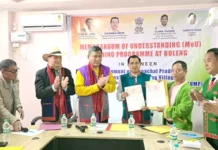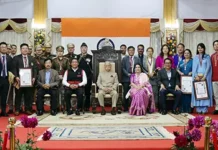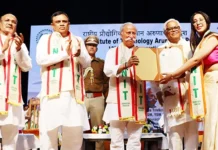Staff Reporter
ITANAGAR, 31 Jul: The Central Pollution Control Board (CPCB) informed the National Green Tribunal (NGT) that the Itanagar Municipal Corporation (IMC), which is responsible for the management of solid waste and sewage in Itanagar and Naharlagun “fails completely to comply with the provisions of the Solid Waste Management Rules, 2016, and the Bio-Medical Waste Management Rules, 2016.”
“In fact, the civic body is found to be least bothered to comply with the rules and it is even found mixing the Covid-19 waste with the other solid wastes before dumping in a hill slope without any treatment,” the CPCB said in its affidavit to the tribunal in response to a petition filed by Youth Mission for Clean River chairman SD Loda earlier in June, seeking a direction to the respondents to clean stretches of the Senki, Pachin and Dikrong rivers.
Informing that the IMC is allowing burning of solid waste, including plastic waste, in front of commercial establishments like automobile workshops, public parks, etc, the CPCB said that “the IMC also fails to restrict the dumping of solid wastes directly into the river at Itanagar and Naharlagun,” and pleaded with the NGT to include the IMC as a respondent in the case.
As per the provisions of the Solid Waste Management Rules, 2016, the IMC should be authorized by the Arunachal Pradesh State Pollution Control Board (APSPCB) for solid waste management.
“The IMC should apply to the SPCB for the authorization. It is observed that neither IMC is applying for authorization to the SPCB nor APSPCB is taking any action against IMC for violation of the provision of the SWM Rules, 2016… IMC is showing total disregard to the provisions of the applicable environmental laws regarding management of solid waste, including bio-medical waste, generated in Itanagar and Naharlagun,” the CPCB said.
The central board also informed the tribunal that the environmental laboratory of the APSPCB is not equipped fully with instruments and manpower at present, but said that “the laboratory shall be developed to analyze the water, effluent
quality parameters as well as emission parameters,” and that the river water quality should be monitored by the state board on a monthly basis.
Also submitting its affidavit to the NGT, the APSPCB informed that the state board, along with the CPCB, Shillong, collected water samples from the Senki river, the Pachin river and the Dikrong river on 22 June this year “from five locations, which were analyzed in the laboratory of CPCB, Shillong.”
During a visit by officials of the CPCB, the IMC and the APSPCB, it was observed that the proposed plant in Chimpu is a septage management plant, having a capacity of 100 kld, and not a sewage treatment plant, the CPCB said.
“One sewage treatment plant (STP) will also be required to treat the sewage generated from Itanagar city having a population of around 59,490 (2011 census),” the APSPCB said.
The team also visited the proposed site of the STP, located near the helipad in Naharlagun, which has a designed capacity of 3 mld, and observed that “it would not be sufficient to treat the sewage generated from Naharlagun city, having a population around 36,158 (2011 census).”
The APSPCB said that there should be adequate provisions for treatment of sewage in Itanagar, Naharlagun, Nirjuli and Banderdewa to prevent water pollution of the Dikrong river stretch (44.4 kms in length).
The APSPCB said it has written to the IMC commissioner and the urban development secretary to keep provision for additional sewage treatment plants in Itanagar and Naharlagun and a new STP each in Nirjuli and Banderdewa for proper treatment of sewage waste and preventing pollution of the Senki-Pachin-Dikrong river stretch.
While the APSPCB and the CPCB informed about several points in the government’s plans of constructing sewage/septage plants and the boards’ efforts to implement the waste management rules, the NGT said that “neither of the two affidavits (by the APSPCB and CPCB) mentions as to what action has been taken against the IMC or against the hotels, restaurants and other commercial establishments, particularly when the pollution being caused in the three rivers, namely, Senki, Pachin, Dikrong, are admitted in the affidavit of the APSPCB.”
The tribunal also took note of the silence of the boards regarding remedial steps to prevent water pollution in the 44.4 km stretch of the Dikrong river.
The NGT granted the state government four weeks’ time to file a counter-affidavit, “bringing on record the action taken plan to remedy the allegations of environmental degradation caused to the three rivers.”
The case has been listed for 7 September.



